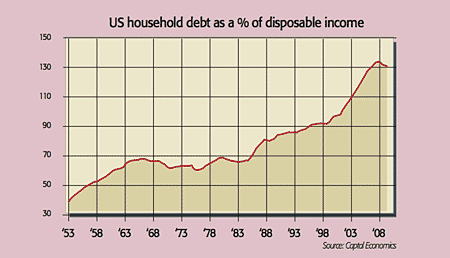Get the latest financial news, insights and expert analysis from our award-winning MoneyWeek team, to help you understand what really matters when it comes to your finances.
You are now subscribed
Your newsletter sign-up was successful
Want to add more newsletters?

Twice daily
MoneyWeek
Get the latest financial news, insights and expert analysis from our award-winning MoneyWeek team, to help you understand what really matters when it comes to your finances.

Four times a week
Look After My Bills
Sign up to our free money-saving newsletter, filled with the latest news and expert advice to help you find the best tips and deals for managing your bills. Start saving today!
Most people are quick to dismiss the idea that Japan's credit bubble and bust in the 1980s and 1990s is relevant to the West's situation now. They shouldn't be, says Richard Cookson of HSBC.
For starters, it's hard to argue that Japan's bubble was much bigger: in the five years to the peak of the bubble in 2000, US stocks rose by 220%, compared to 224% in Japan during the late 1980s. House prices in America rose by more than Japanese land prices (a proxy for house prices) in the five pre-peak years.
Nor is the latest global market rally proof that we are out of the woods. There have also been six 20%-plus and four 50%-plus rallies in Japanese stocks since 1990, says David Rosenberg of Gluskin Sheff. Yet the index is still 75% off its peak.
MoneyWeek
Subscribe to MoneyWeek today and get your first six magazine issues absolutely FREE

Sign up to Money Morning
Don't miss the latest investment and personal finances news, market analysis, plus money-saving tips with our free twice-daily newsletter
Don't miss the latest investment and personal finances news, market analysis, plus money-saving tips with our free twice-daily newsletter
Optimists also say that Western authorities have been much more proactive in containing the fallout and pre-empting deflation than Japan when its bubble burst, says Cookson. But Western central banks had to act fast as they were faced with a collapsing economy, while confidence in the Japanese financial system hadn't been "completely eviscerated".

Japanese deflation only set in in the late 1990s. We don't know yet if central banks have been able to ward off a deflationary "deleveraging trap", only that "they have been aggressive in trying".
Cookson also points out that while Japanese corporate debt was much higher than in America, in Japan household savings offset corporate deleveraging. In Britain and the US, savings are meagre. The hallmark of Japan's experience, moreover, was a lack of demand for new loans as debts were wound down a process that has now begun in Britain and America.
As Japan showed, once deleveraging begins, "retrenchment takes many years", says Albert Edwards of Socit Gnrale, "rendering the economy extremely vulnerable to rapid relapses".
American households have reduced their debts for four successive quarters, as Capital Economics points out, but with debt still at 129% of household income, miles above the 30-year average, unemployment rising and wage growth slowing rapidly, there is still a long way to go.
It's a similar story in Britain, with businesses and households (whose debts are even higher than in America) retrenching. And as wages continue to slump, the danger of a deflationary spiral is growing, says Capital Economics. As Rosenberg puts it: "Sushi, anyone?"
Get the latest financial news, insights and expert analysis from our award-winning MoneyWeek team, to help you understand what really matters when it comes to your finances.
MoneyWeek is written by a team of experienced and award-winning journalists, plus expert columnists. As well as daily digital news and features, MoneyWeek also publishes a weekly magazine, covering investing and personal finance. From share tips, pensions, gold to practical investment tips - we provide a round-up to help you make money and keep it.
-
 Should you buy an active ETF?
Should you buy an active ETF?ETFs are often mischaracterised as passive products, but they can be a convenient way to add active management to your portfolio
-
 Power up your pension before 5 April – easy ways to save before the tax year end
Power up your pension before 5 April – easy ways to save before the tax year endWith the end of the tax year looming, pension savers currently have a window to review and maximise what’s going into their retirement funds – we look at how

